|
 Secure Site
Secure Site
|
 |
Archive for April, 2012
 Just Say No to a Snooze Button, Get the Zen Alarm Clock Most modern alarm clocks include a “snooze button” mechanism which allows the user to go back to sleep for a brief period after the initial alarm.
While this may make it easier for some people to “face the day,” here at Now & Zen we feel the whole concept of a snooze button is “all wrong.”
People want snooze buttons because they want to awaken gradually. And this is only natural because just as our bodies fall asleep gradually, our bodies also want to wake up gradually. However, with a regular, snooze button-equipped alarm clock the user is initially “startled awake” by the alarm, and then continually startled awake with each press of the snooze button. This is not the way to treat your body because it creates a kind of merry-go-round of multiple “rude awakenings.”
As an alternative we recommend using our Zen Alarm Clock, which wakes users gradually with a built-in 10 minute progression of gradually increasing acoustic chimes. It really is a better way to get up in the morning.
Zen Alarm Clocks make waking up a beautiful experience. And once you experience the Zen Clock’s gradual 10 minute chime progression, you will never want to wake up any other way again.
 Zen Clocks without Snooze buttons
Now & Zen Headquarter Store
1638 Pearl Steet
Boulder, CO 80302
(800) 779-6383
Posted in sleep, Sleep Habits, Zen Alarm Clock
 Dreams May Improve Our Memory - Toyokuni Utagawa, Flower Arrangement Getting a good night’s sleep after trying to master a tough new task might just reinforce what you have learned.
European researchers say dreaming might be the brain’s way of replaying experiences and lessons so that they are fixed in the memory for use later on.
The scientists used advanced imaging technology and found that the same regions of the brain that are buzzing while we learn a new task are also active while we dream. This heightened activity was observed during the brief but active stage known as rapid-eye movement, or REM, sleep.
The study was published in the August issue of Nature Neuroscience and was led by Pierre Maquet of the University of Liege in Belgium.
Animal studies had shown similar results. Rats that ran new routes through mazes showed increased activity in the same portions of their brains when they slept afterward. But the human brain is more complex.
“It is wonderful to see such results demonstrated in humans for the first time,” said David Silbersweig, co-director of the functional neuroimaging research laboratory at the New York-Cornell Medical Center.
Why Sleep? Humans spend one-third of their lives asleep, but sleep’s purpose is poorly understood. Among other things, scientists believe dreaming may help sort out emotions, impressions and other ideas.
In the study, 18 volunteers ages 18 to 25 spent several hours learning how to quickly recognize symbols as they flashed on a computer screen and press the same symbol on a keyboard.
During the test, the activity in several regions of their brains was monitored by PET scans, which reveal how the brain is functioning by watching its use of glucose and oxygen, the fuels of brain cells.
 Can Dreams Help Improve Our Memory? Groups of volunteers were tested in several ways. Those who took the computer test for several hours, slept and retook the test when they woke up scored the highest, with even faster reaction times after they slept.
PET scans showed that during REM sleep their brain activity and blood flow were similar to when they were taking the test.
Researchers said the volunteers might have been practicing the test in a REM dream and storing what they learned.
However, Maquet’s team could not identify the precise cellular mechanisms involved. Nor are all memories consolidated only during REM sleep, the researchers said.
Boulder, Colorado—an innovative company has taken one of life’s most unpleasant experiences (being startled awake by your alarm clock early Monday morning), and transformed it into something to actually look forward to. “The Zen Alarm Clock,” uses soothing acoustic chimes that awaken users gently and gradually, making waking up a real pleasure.
Rather than an artificial recorded sound played through a speaker, the Zen Clock features an alloy chime bar similar to a wind chime. When the clock’s alarm is triggered, its chime produces a long-resonating, beautiful acoustic tone reminiscent of a temple gong. Then, as the ring tone gradually fades away, the clock remains silent until it automatically strikes again three minutes later. The frequency of the chime strikes gradually increase over ten-minutes, eventually striking every five seconds, so they are guaranteed to wake up even the heaviest sleeper. This gentle, ten-minute “progressive awakening” leaves users feeling less groggy, and even helps with dream recall.
adapted from abcnews.go.com by Joseph B. Verrengia
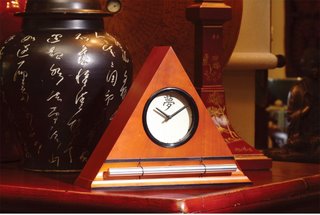 The Zen Alarm Clock transforms mornings, awakening you gradually with a series of gentle acoustic chimes Once you use a Zen Clock nothing else will do Now & Zen – The Zen Alarm Clock Store
1638 Pearl Street
Boulder, CO 80302
(800) 779-6383
orders@now-zen.com
Posted in Bamboo Chime Clocks, Insomnia, sleep, Sleep Habits
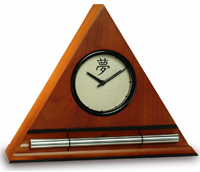 No Snooze Button Alarm Clocks with Gradual Chime Sequence The Walnut Digital Zen Clock’s long-resonating Tibetan bell-like chime makes waking up a beautiful experience – its progressive chimes begin your day with grace. One of the best features of the Zen Alarm Clock is that it doesn’t have a snooze button! It has a built-in snooze that chimes over 10 minutes!
When the clock’s alarm is triggered, the acoustic chime bar is struck just once … 3-1/2 minutes later it strikes again … chime strikes become more frequent over 10 minutes … eventually striking every 5 seconds until shut off. As they become more frequent, the gentle chimes will always wake you up – your body really doesn’t need to be awakened harshly, with a Zen Clock you’re awakened more gradually and thus more naturally. Unlike artificial recorded sounds coming out of a tiny speaker in a plastic box, natural acoustic sounds transform your bedroom or office environment.
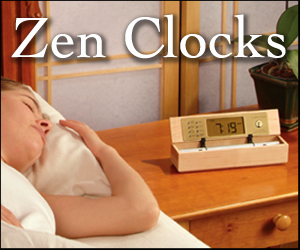 No snooze buttons allowed... Now & Zen – The Zen Alarm Clock Store
1638 Pearl Street
Boulder, CO 80302
(800) 779-6383
Posted in Bamboo Chime Clocks
 meditating may change your brain Apparently, people who meditate are a bit thickheaded—in a good way of course. A new study led by Massachusetts General Hospital shows that the regular practice of a particular form of meditation appears to thicken areas of the brain associated with attention and sensory processing.
Brain scans of experienced, frequent meditators showed thickening in the insula, an area of the cortex involved in the integration of emotion with thought. Most of the structural changes occurred in the right hemisphere of the brain, in the prefrontal cortex, which regulates memory and attention. This area tends to thin as we age, and yet the thickening was more pronounced in older practitioners. According to Sara Lazar, PhD, the study’s lead author, this evidence suggests that meditation may slow down the atrophy of certain areas of the brain that typically occurs with age.
Perhaps even more interesting, you needn’t don robes and retire to a cave somewhere to achieve these results. Instead of scanning the brains of Buddhist monks who devote their lives to meditation, researchers enrolled 20 people who averaged nine years of experience and about 40 minutes a day meditating. (Fifteen people with no experience in meditation formed the control group.) Those participants who meditated most deeply—as measured by breathing rates—showed the greatest changes in their brains, which suggests that meditation caused the thickening, as opposed to the thickening indicating a predisposition to meditate.
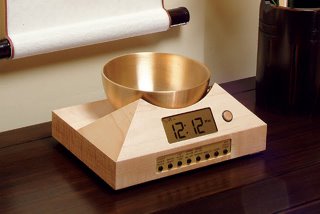 Tibetan Bowel Meditation Timers adapted from Natural Solutions Magazine, August 2006 by Megan Keough
Now & Zen’s Meditation Timer Store
1638 Pearl Street
Boulder, CO 80302
(800) 779-6383
Posted in intention, Meditation Timers, Meditation Tools, mindfulness practice, Well-being, zen monks, Zen Timers
 solving problems in your sleep Text by Louisa Kamps
There’s a huddle of beefy thugs butchering a wolf at the base of a glassy tower that I must enter. The butchers turn from their prey, snarling, to chase me, but I manage to sneak in through a secret back door.
I race to the top floor, where an editor I respect hands back the tall cup I’ve been making smoothies in lately, pronouncing my most recent concoction bland and obvious.
I’m stung but can’t help noticing she’s managed to choke down the last drop.
Now, what to make of a dream like that? Part of me shies from supposing it has any deep meaning. Therapeutic dream analysis has become something of a punch line in this post-Freudian age. (So, doc, I was paddling around in a canoe when my father handed me a giant dagger….)
Then there’s the theory espoused by prominent neurologists since the late 1970s: Dreams are just physiological reactions to stimuli from the nervous system as our brains rest and digest the remains of the day.
Still, I can’t help thinking that this wacky night theater I’ve created must be doing something important.
There’s still so much we don’t know about dreams — like what causes them in the first place — but we may soon begin to unravel the mystery. Thanks to intensified efforts to understand what causes sleep disorders and determine how we can treat them, a growing body of research has recently converged to show that dreams not only help us consolidate new learning and think more creatively, but also recover more quickly from life’s emotional slings and arrows.
Anatomy of a Dreamscape
We typically spend more than 25 percent of our sleep time in a state conducive to dream weaving. As we drift off and enter stage 1, the light phase between sleep and waking, eye movement and muscle activity begin to slow.
 what do dreams mean? From there we move through stages 2 and 3, progressively deeper phases in which breathing and brain waves continue getting slower. About 90 minutes in, we’ll return to lighter sleep before suddenly moving into the phase known as rapid eye movement, in which most dreaming occurs.
We’ll cycle between REM and deeper sleep three to five times during the night, each time staying longer in dream-conducive REM.
During REM sleep, some of the physical and cognitive abilities that serve us so well in waking life fall away: Our muscles go slack to keep us from acting out on our dreams; parts of the brain’s prefrontal cortex responsible for decision-making become less active; the hippocampus, involved in recalling details of recent events, is less active too.
At the same time, the entire midsection of the brain — the region associated with emotion, including the amygdala, which assesses threats and triggers adrenaline — lights up. And in this alternate state of consciousness, during which we’re blind to the real world’s distractions yet flush with vivid imagery and strong feeling, our brains are sifting through new information, searching for ways to integrate it into what we already know and lay the important parts down permanently in memory.
Solving Problems in Your Sleep
In a series of studies looking at dreams’ impact on creative problem-solving, Sara Mednick, an assistant professor of psychiatry at the University of California, San Diego, has shown that naps including periods of REM (which we usually reach after about 50 minutes in an afternoon snooze) have significant cognitive benefits, repeatedly beating out caffeine as a secret weapon in mental performance tests.
In a paper she copublished last year, Mednick described giving subjects a creativity task in which they were asked to come up with a fourth word connected to three seemingly unrelated words. (For instance, “coin,” “quick,” and “spoon,” where “silver” is the missing link.)
Subjects took a test in the morning, then rested quietly before taking another test in the evening. Those who slept but didn’t fall into REM showed no improvement on their second test. But those who did get REM sleep scored 40 percent higher on the evening test than they had in the morning.
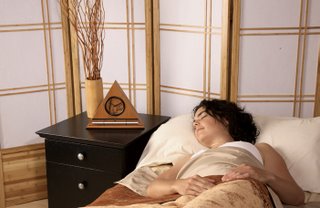 solving problems in your dreams To Mednick, this suggests that dreaming — when the becalmed hippocampus slows its efforts to relay rote, “explicit” information (which is consolidated in deeper, slow-wave sleep) — is the perfect workshop for making more abstract associations between facts and ideas already established in unconscious memory.
“REM allows us to take bits of information, de-emphasize the details of how the world works, ” she said.
Whole Living, November 2010
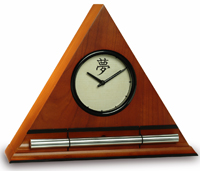 gentle wake up clock with chimes Now & Zen Chime Alarm Clock Headquarters
1638 Pearl Street
Boulder, CO 80302
(800) 779-6383
Posted in Chime Alarm Clocks
 Choose a Gentle Wake Up in the Morning -- The Z E N Alarm Clock A Sleep in America Poll released by the National Sleep Foundation in 2008 reported that 65 percent of Americans have trouble falling asleep, wake during the night or wake feeling unrefreshed at least a few times each week. (On average, individuals need at least eight hours of sleep, but a recent finding that genetic makeup may play a role in how much sleep each person needs was published by UCSF researchers last week.)
Boulder, Colorado—an innovative company has taken one of life’s most unpleasant experiences (being startled awake by your alarm clock early Monday morning), and transformed it into something to actually look forward to. “The Zen Alarm Clock,” uses soothing acoustic chimes that awaken users gently and gradually, making waking up a real pleasure.
Rather than an artificial recorded sound played through a speaker, the Zen Clock features an alloy chime bar similar to a wind chime. When the clock’s alarm is triggered, its chime produces a long-resonating, beautiful acoustic tone reminiscent of a temple gong. Then, as the ring tone gradually fades away, the clock remains silent until it automatically strikes again three minutes later. The frequency of the chime strikes gradually increase over ten-minutes, eventually striking every five seconds, so they are guaranteed to wake up even the heaviest sleeper. This gentle, ten-minute “progressive awakening” leaves users feeling less groggy, and even helps with dream recall.
adapted from SFgate.com by Carolyne Zinko
 Gentle, Soothing, and Elegant Sounding Alarm Clocks -- No Beeping Electronics
Now & Zen – The Zen Alarm Clock Shop
1638 Pearl Street
Boulder, CO 80302
(800) 779-6383
orders@now-zen.com
Posted in Bamboo Chime Clocks, Natural Awakening, sleep, Sleep Habits, wake up alarm clock, Well-being
 sleep better naturally Making a few changes in your sleep regimen may ease your insomnia more effectively than popping a pill, according to a recent study from the Journal of the American Medical Association. Of the study’s 46 insomniac participants, those who learned new sleep-inducing strategies (relaxation exercises; creating a more sleep-friendly bedroom) spent 52 percent less time tossing and turning after six weeks. Those who took the sleeping pill Imovane cut back on their wake time by only 4 percent. To shake off chronic insomnia, author Borge Sivertsen, Psy.D., suggests following a two-week sleep restriction plan: Wake up around 6 a.m. every day, avoid daytime naps, and wait as long as you can before hitting the sack each night.
Body+Soul, November/December 2006
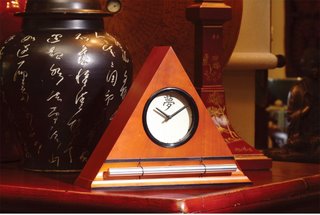 sleep better naturally, wake up with a calming zen alarm clock Now & Zen
1638 Pearl St.
Boulder, CO 80302
(800) 779-6383
Posted in Insomnia, Natural Awakening
 Choose The Zen Alarm Clock - for a Gentle, Progressive Awakening Sleep deprivation is a little known, but serious national problem.
So believes Dr. William Dement, M.D., Ph.D., considered the world’s leading authority on sleep, sleep deprivation and the diagnosis and treatment of sleep disorders.
A groundbreaking pioneer in the early days of sleep research, Dement is an outspoken advocate for sleep awareness as a cure for what he calls a “sleep-sick society.” He recently authored a book, “The Promise of Sleep”, a comprehensive overview of what happens when we sleep, its effect on overall health, and the dangers of sleep loss and deprivation.
Still active in the field at age 71, Dement draws upon four decades of experience as a dedicated scientist, sleep doctor, and clinic and laboratory administrator. He is the founder and director of the Stanford Sleep Disorders Center, the world’s first sleep disorders center, where people continue to seek treatment, and research is ongoing.
His book is a definitive guide to sleep and what he calls its “vital connection between health and happiness.” Co-written with Christopher Vaughan, the 540-page book covers everything from the definition of sleep and history of sleep and sleep disorder research, to chronic disorders and treatments.
Dement explores the connection between sleep and physical and mental well-being, presents insightful background on dreams – one of his early interests, and offers a step-by-step guide to help people take personal stock of their sleep needs at any age. Readers will also find useful information about the variety of disorders that exist and their definitions, and a listing of sleep center locations by state and sleep-related Web sites.
“Sleep deprivation is an across-the-board problem. But society is completely ignorant about sleep. It’s time people wake up and move sleep education into the mainstream,” said Dement, whose expertise is frequently sought.
Some of the world’s biggest catastrophes can be linked, in part, to sleep deprivation, incidents such as the Three-Mile Island nuclear event, Exxon Valdez oil spill, and even the Challenger shuttle explosion. “These events happened because someone fell asleep,” said Dement.
“In a recent survey by the National Sleep Foundation, 23 percent of people polled admitted to falling asleep while driving,” Dement writes in his book. “With this mind, it should come as no surprise that sleep deprivation plays a major role in most accidents labeled “cause unknown,’ or that an estimated 24,000 people die each year in accidents caused directly or in part by falling asleep at the wheel. Almost all of us, regardless of our formal education, are dangerously misinformed about drowsy driving and its causes.”
Dement serves as chairman of the National Commission on Sleep Disorders Research, whose report led to creation of the National Center on Sleep Disorders Research – a new agency within the National Institutes of Health.
 Choose A Soothing Alarm Clock - Sleep deprivation is a little known, but serious national problem. In 1992, the commission’s report to Congress, “Wake Up America: A National Sleep Alert” urged more federal funding for sleep research, and a campaign of public awareness about the nature and impact of sleep disorders, calling sleep deprivation “a national emergency.”
Dement in 1975 launched the American Sleep Disorders Association and served as president for a dozen years. He teaches a popular “Sleep and Dreams” course at Stanford and wrote the first undergraduate textbook in the field.
“People don’t realize that sleep loss piles up like a debt. People think that sleep debt goes away, but it only gets bigger,” said Dement, who continues to address the problem before civic and business groups, governmental bodies and health professionals across the country.
“I’m sounding the alarm in every way I can.”
Waking up in the morning should be as pleasant as falling asleep at night. The Zen Alarm Clock’s gradual, gentle awakening is transformative.
Boulder, Colorado—an innovative company has taken one of life’s most unpleasant experiences (being startled awake by your alarm clock early Monday morning), and transformed it into something to actually look forward to. “The Zen Alarm Clock,” uses soothing acoustic chimes that awaken users gently and gradually, making waking up a real pleasure.
Rather than an artificial recorded sound played through a speaker, the Zen Clock features an alloy chime bar similar to a wind chime. When the clock’s alarm is triggered, its chime produces a long-resonating, beautiful acoustic tone reminiscent of a temple gong. Then, as the ring tone gradually fades away, the clock remains silent until it automatically strikes again three minutes later. The frequency of the chime strikes gradually increase over ten-minutes, eventually striking every five seconds, so they are guaranteed to wake up even the heaviest sleeper. This gentle, ten-minute “progressive awakening” leaves users feeling less groggy, and even helps with dream recall.
adapted from sfgate.com by Elaine Larson
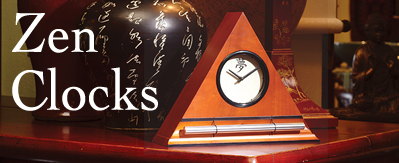 The Zen Alarm Clock Shop - Boulder, CO Now & Zen – The Zen Alarm Clock Shop
 The Zen Alarm Clock Showroom - Boulder, CO - orders@now-zen.com 1638 Pearl Street
Boulder, CO 80302
(800) 779-6383
orders@now-zen.com
Posted in Bamboo Chime Clocks, sleep, Sleep Habits
 Choose a gentle, chime alarm clock - an alternative, soothing alarm clock When Margaret Chau has a bad night’s sleep, she knows to steer clear of loved ones the next day – she’s cranky and impatient, and she tends to take it out on others.
“I don’t want to deal with things because I’m afraid of not being able to do it rationally or logically,” said the Millbrae woman, who suffers from chronic insomnia due to back pain. “I know myself, and I don’t want to react badly or do something I might regret.”
It’s no secret that the sleep-deprived are usually grumpy, miserable and not much fun to be around, but new research from UC Berkeley using brain-scanning equipment helps explain why. The study, which was published Monday in the journal Current Biology, was the first to use MRI technology to show exactly what areas of the brain are affected by sleep deprivation.
Results show a connection between negative thinking and lack of sleep, and while there is still years, if not decades, of research to be done on the subject, the study’s authors say it could point to a connection between sleep deprivation and psychiatric disorders like depression and post-traumatic stress syndrome.
It could even help explain road rage, said Matthew Walker, director of UC Berkeley’s Sleep and Neuroimaging Laboratory and senior author of the study, which was coordinated with researchers from Harvard University.
“One of the functions of sleep is to reset and replenish the emotional integrity of our brain circuits so we can approach the day’s emotional challenges in appropriate ways,” Walker said. “If you don’t get a good night’s sleep, you’ll be making irrational choices.”
 Choose a peaceful chime alarm clock Americans are among the most sleep-deprived people in the world, doctors and sociologists say. About 40 percent of Americans get less than seven hours of sleep a night, according to a 2005 poll conducted by the National Sleep Foundation, and 75 percent reported having some sort of sleep disorder one or two nights a week.
National guidelines recommend people get between seven or eight hours of sleep a night.
Polls also show that Americans are getting less sleep all the time, as people deal with daily distractions, from work and family life to just staying up late watching TV or surfing the Internet. The National Sleep Foundation poll found that only 26 percent of adult Americans were getting at least eight hours of sleep a night in 2005, compared to 35 percent in 1998.
But lack of sleep isn’t just confined to adults.
Dr. Rafael Pelayo, director of Pediatric Sleep Service at Lucile Packard Children’s Hospital, said he’s noticed sleep deprivation is a growing problem among teenagers.
“They seem to be modeling their parents and getting as little sleep as possible. They’re routinely staying awake past their parents and they’re drinking more coffee,” Pelayo said. “Sleep is still an afterthought for most people; it’s something they can sacrifice. But sleep is actually an important cornerstone of health.”
Lack of sleep can lead to a loss of concentration and memory, can make people more sluggish and reduce motor skills, and can even weaken the immune system. But it also increases activity in the parts of the brain related to a variety of psychiatric disorders, according to the new research.
In the UC Berkeley study of 26 young adults, half of the subjects were kept awake for 35 hours straight and the other half were allowed a normal night’s sleep in that same time period. Then all of the subjects were hooked up to an MRI and shown a series of images, some of them disturbing pictures of graphic violence or gory injuries. Researchers monitored what happened in their brains as each image was shown.
When shown the disturbing images, the sleep-deprived subjects had a significant jump in activity in the amygdala, the section of the brain that puts the body on alert to protect itself. At the same time, activity slowed down in the prefrontal cortex, which controls logical reasoning.
Subjects who had gotten a full night of sleep showed normal brain activity.
What this means for most people is that a sleepless night can cause them to overreact to emotional challenges that they would otherwise be able to tolerate with no trouble, Walker said.
That’s why new parents might be more prone to snap at each other over petty arguments, or morning commuters might be more likely to lay on the horn when someone cuts them off instead of just let it go, Walker said. It also might make horror movies scarier, as the brain doesn’t do quite as good a job at separating fact from fiction.
“We become emotionally dis-regulated,” Walker said. “Ordinarily, if you saw a gun pointed at your face, you wouldn’t overreact because your brain puts it in context and tells you that you’re sitting in a movie theater staring at a screen. But that function seems to be disconnected when you’re sleep-deprived.”
Much more research needs to be done, Walker said, but sleep experts are already hopeful that more study could lead to refined options for treating not just sleep disorders, but psychiatric problems such as depression and anxiety.
Dr. Anil Rama, medical director of the Regional Sleep Medicine Laboratory at Kaiser Permanente in San Jose, said he’s intrigued by Walker’s research, but notes that the brain responses to sleep deprivation are likely so complicated that not much will change in terms of treatment any time soon.
Eventually, “if we start looking at the pathways that are involved with sleep deprivation, perhaps we can intervene there,” he said. “But I’m skeptical that isolating one particular pathway is very important. It has to be in the context of a whole body of literature, and there are so many things our emotional centers are tied into.”
adapted fro SFgate.com by Eric Allday
 Peaceful Chime Alarm Clock - The Zen Clock Store - Boulder, CO Now & Zen – The Zen Alarm Clock Shop
 The Peaceful Alarm Clock Store - Boulder, CO 1638 Pearl Street
Boulder, CO 80302
(800) 779-6383
orders@now-zen.com
Posted in Bamboo Chime Clocks, sleep, Sleep Habits
 Use Your Gong Meditation Timer for Your Stillness Practice New research suggests that qualities the world desperately needs more of — love, kindness and compassion — are indeed teachable.
Imaging technology shows that people who practice meditation that focuses on kindness and compassion actually undergo changes in areas of the brain that make them more in tune to what others are feeling.
“Potentially one can train oneself to behave in a way which is more benevolent and altruistic,” said study co-author Antoine Lutz, an associate scientist at the University of Wisconsin-Madison.
How far this idea can be extrapolated remains in question, though.
“I think there’s no question that people can benefit from these practices,” said Dr. Louis Teichholz, medical director of complementary medicine and chief of cardiology at Hackensack University Medical Center in New Jersey. “I think the question is how easy is it to get trained enough so that it will make a clinical difference, and I don’t think this study answers that.”
The findings were published in the March 26 issue of the Public Library of Science One.
Recent brain-imaging studies have suggested that the insula and the anterior cingulate cortices regions are involved in the empathic response to other people’s pain. But not much is known about how cultivating compassion might affect brain circuitry.
And previous research has indicated that meditation may reduce the brain’s reaction to pain, and that it may actually improve cardiovascular health by decreasing the risk of metabolic syndrome.
“The main research question was to see whether some positive qualities such as loving-kindness and compassion or, in general, pro-social altruistic behavior, can be understood as skills and can be trained,” Lutz explained.
In the same way that training in sports or chess or music produces functional and structural changes in the brain, the Wisconsin researchers wanted to see if cultivating compassion through the practice of meditation also produced brain changes — suggesting that compassion could be viewed as a learned skill.
 Meditation can increase compassion - choose a soothing meditation timer The study involved 32 people: 16 Tibetan monks and lay practitioners, who had meditated for a minimum of 10,000 hours throughout their lifetime (the “experts”); and 16 control subjects, who had only recently been taught the basics of compassion meditation (the “novices”).
The senior author of the paper, Richard Davidson, a professor of psychiatry and psychology at the University of Wisconsin-Madison and an expert on imaging the effects of meditation, has been collaborating with the Dalai Lama since 1992, studying the brains of Tibetan monks.
For the study, individuals in the control group were instructed first to wish loved ones well-being and freedom from pain, then to wish such benefits to humankind as a whole.
“We looked at whether there were any differences between experts and novices in generating compassion with the idea that a central practice in this tradition [of meditation] is to cultivate these positive emotions,” Lutz said. “We wanted to see if there were any differences in the way the brain was reacting.”
Each participant was hooked up to a functional MRI both while meditating and not meditating. During each state, the participants heard sounds designed to produce responses: the negative sound of a distressed woman, the positive sound of a baby laughing, and the neutral sound of background noise from a restaurant.
“We showed altered activation in brain circuitry that was previously linked to empathy and perspective-taking or the capacity to understand other’s intentions and mental states and, more precisely, the insula was more activated, particularly in response to negative emotional sounds,” Lutz said.
In the monks, especially, these areas of the brain were activated even more when they hard the cries of the distressed woman, she said.
The study authors hope the findings might one day help with a range of problems, including reducing the incidence of bullying in schools or helping people with depression.
“The next step is to see if this works,” Lutz said. “If it works, then it can be applied to selective populations — for instance, depressed people or, more broadly, in education.”
 Can you cultivate compassion? More information
The U.S. National Center for Complementary and Alternative Medicine has more about meditation and health.
SOURCES: Antoine Lutz, Ph.D., associate scientist, Waisman Center, University of Wisconsin-Madison; Louis E. Teichholz, M.D., medical director, complementary medicine, and chief, cardiology, Hackensack University Medical Center, New Jersey; March 26, 2008,Public Library of Science One
Use our unique “Zen Clock” which functions as a Yoga & Meditation Timer. It features a long-resonating acoustic chime that brings your meditation or yoga session to a gradual close, preserving the environment of stillness while also acting as an effective time signal. Our Yoga Timer & Clock can be programmed to chime at the end of the meditation or yoga session or periodically throughout the session as a kind of sonic yantra. The beauty and functionality of the Zen Clock/Timer makes it a meditation tool that can actually help you “make time” for meditation in your life. Bring yourself back to balance.
 Gong Meditation Timer in Bamboo Now & Zen – The Meditation Timer Shop
1638 Pearl Street
Boulder, CO 80302
(800) 779-6383
Posted in Bamboo Chime Clocks
« Previous Page — « Previous Entries
Next Entries » — Next Page »
|
|
|
|